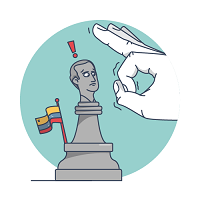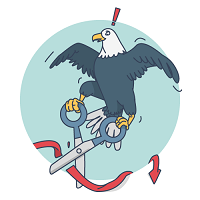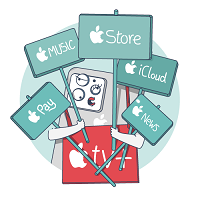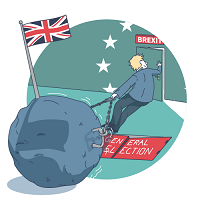You are using an outdated browser. Please upgrade your browser to improve your experience.
Article | 05 December 2019 |
QUICK LOOK
THE MARKETS

25.3%S&P 500 |
23.4%EURO STOXX 50 |
9.2%FTSE 100 |
24.8%CAC 40 |
25.4%DAX 30 |
20.4%BEL 20 |
26.9%FTSE MIB |
9.5%IBEX 35 |
13.7%TOPIX |
Source: Bloomberg 01.01.2019 - 29.11.2019

Juan Guaidó has claimed the title of President of Venezuela, following the disputed election last year. Governments in the US, Europe and across the Americas have backed his aim to rebuild this shattered economy. Why does Venezuela matter? The country is estimated to have vast oil reserves, and yet currently supplies only 1% of the world’s oil. If the economy could be set back on its feet, then Venezuela could potentially rival Saudi Arabia, Russia and the US as a key global supplier.

The minutes from the latest US Federal Reserve meeting show that most governors are happy with the new ‘patient posture’. That means they will be holding US interest rates steady. Risks to economic growth are most likely to come from overseas, namely the trade dispute with China and even Brexit. Financial markets continued their sharp rebound from the lows of December. Meanwhile, the debate continues - is this peak or pause for US interest rates?

China’s government announced that GDP growth this year would be lower, in a range of 6-6.5%. Even after this slight downward tweak that rate of growth looks great compared to most developed economies, some of which are even struggling to avoid recession. For China, though, it’s the slowest rate of growth for three decades. New stimulus measures, such as tax cuts and investment reforms, have seen the Chinese stock market rally sharply from last year’s lows. But the US trade war and the huge legacy of debt remain unresolved.

US markets have climbed back to the peak levels of last autumn. Quite a reversal from the low point reached on Christmas Eve. So what’s changed? The US Federal Reserve has been a big contributor to the more bullish frame of mind. Instead of planned rate hikes, the market now believes the Fed could be just as likely to cut interest rates this year. And that’s exactly the sort of supportive policy that equity markets thrive on.

Huawei has become the trade war’s most high profile casualty. First the US excluded the telecoms giant from 5G contracts. Now they have been labelled a ‘banned entity’, meaning no US company can do business with them. Google has refused Huawei access to its Android operating system. And that means no YouTube or Gmail. Mobile operators in the UK and Japan have pulled the phones from their networks. With chip makers also blocking its plans to develop components, Huawei looks like a sitting target.

The price of gold is on the rise. The yellow metal hit a six year high this month. What’s the appeal? It’s not unusual when interest rate cuts are expected. Gold is viewed as precious, but it has no yield and costs money to store. In a world where $12.5 trillion of government bonds now have a negative yield, suddenly that doesn’t matter anymore. And as markets hover around record high levels, the lustre of a safe haven has proved hard to resist.

The US Federal Reserve cut interest rates for the first time since 2008. But it was only by 0.25% and there was no promise of further cuts this year. Markets had run up pretty strongly before the news and were disappointed. The S&P had broken through the record 3,000 level but slipped back on the news. Markets might now look elsewhere, perhaps to the European Central Bank (ECB), for more rate cuts this year.

Trade war turmoil has rolled over into fears for global growth. Financial markets have seen a rush to safe havens. Gold is enjoying its best performance for eight years. But the dash to buy government bonds has been the biggest story. As bond prices rise the yield on the bond goes down. The effect has been so sharp that the yields on government bonds totalling $15 trillion have been pushed below zero. In these strange times a guaranteed negative return appears a price worth paying for safety.

Apple launched its new iPhone handset with some fanfare, but an identical price tag to the last model. Perhaps the tech giant has hit the price ceiling for its handsets and tablets. And that’s why Apple is looking for alternative revenue streams. The focus will switch to services, such as music, games and the newly launched Apple TV+ streaming service. This helps to keep users of older iPhones in the Apple ‘ecosystem’ and still generating revenue. But at only $4.99 per month, will TV+ ever justify a market value above $1 trillion?

The Brexit saga failed to reach a conclusion. PM Boris Johnson won backing to debate his Withdrawal Agreement Bill, but Parliament immediately refused to agree his speedy agenda for exit. Government business was put on hold while the PM turned his attention to a pre-Christmas election. To save the UK from crashing out with no deal the EU granted a three month ‘flextension’ until 31 January 2020. Financial markets were relieved when a Halloween Brexit was sidestepped. Sterling enjoyed a brief rally, quickly running out of steam as uncertainty rolled on.

Alibaba, the Chinese ecommerce and online payments giant, raised over $11bn in the biggest IPO of the year. The Hong Kong listing has the ticker symbol 9988, auspicious numbers in Chinese culture. Demand was high and the stock jumped over 6% at the opening. At such a tense time for Hong Kong, it proves that the Asian financial hub is still very much open for business. And it looks like Hong Kong will even beat the Nasdaq for the total amount raised this year.

As 2019 comes to a close, familiar stories continue to grip the markets. The US/China trade war, Big Tech and the much postponed Brexit have dominated. And the coming year looks to be no different. There will likely be more US wrangling over trade, a deal or perhaps no deal on Brexit, then possible trade negotiations between the EU and the UK. And don’t forget the US presidential election later in the year. Only time will tell how these events play out and the markets’ reaction. In the meantime, we wish all our readers a happy and successful 2020!